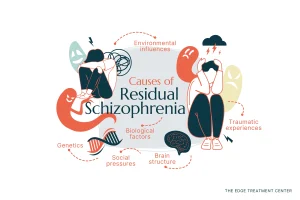Residual schizophrenia is a subtype of a serious and chronic mental health disorder that affects how a person thinks, feels, and behaves. Unlike other forms of schizophrenia, this subtype is characterized by a reduction in the intensity of psychotic symptoms such as hallucinations and delusions. However, symptoms like social withdrawal, lack of motivation, and cognitive issues may persist. Understanding this condition is essential for individuals, caregivers, and mental health professionals.
In this article, we will explore five important facts to help you better understand the symptoms, causes, and treatment options of this disorder.
For those seeking Best Schizophrenia Treatment, consider visiting:

What is Residual Schizophrenia?
This condition occurs when someone diagnosed with schizophrenia experiences a significant reduction in severe symptoms, such as hallucinations or delusions. However, they may continue to deal with “negative” symptoms that can impair daily life.
The term “residual” refers to the fact that more intense, positive symptoms have largely subsided, leaving behind milder but persistent negative ones. These symptoms include:
- Lack of motivation
- Social withdrawal
- Difficulty focusing
- Blunted emotions
Symptoms of Residual Schizophrenia
This form of schizophrenia is marked primarily by negative symptoms, which are more subtle and less dramatic than acute psychosis but can still be disabling. Some of the common symptoms include:
- Reduced emotional expression: Individuals may appear indifferent or unemotional.
- Poor communication skills: Difficulty in organizing thoughts or expressing oneself is common.
- Apathy: Lack of interest in daily activities.
- Social withdrawal: Avoiding social interactions or forming relationships.
- Cognitive impairment: Difficulty with memory, focus, or decision-making may persist.
Causes of Residual Schizophrenia
The exact causes of residual schizophrenia remain unclear, but it is believed to arise from a combination of genetic, environmental, and neurobiological factors. Like other forms of schizophrenia, residual schizophrenia is thought to involve:
- Genetic predisposition: A family history of schizophrenia increases the likelihood of developing the condition.
- Brain structure abnormalities: Research shows that individuals with schizophrenia may have structural differences in their brains, particularly in areas related to thinking and memory.
- Environmental factors: Stressful life events, substance abuse, or childhood trauma may also contribute to the onset of schizophrenia and its residual form.
Treatment Options for Residual Schizophrenia
While the acute psychotic episodes of schizophrenia may be controlled with medications, the negative symptoms of residual schizophrenia can be more difficult to manage. Treatment often involves a combination of therapies, focusing on rehabilitation and long-term support.
- Psychotherapy: Cognitive behavioral therapy (CBT) and other forms of talk therapy can help individuals manage the lingering negative symptoms.
- Rehabilitation programs: These programs are designed to help individuals with residual schizophrenia reintegrate into society by improving their social and vocational skills.
- Support networks: Ongoing support from family, friends, and mental health professionals is crucial for managing the condition.
- Lifestyle changes: Regular exercise, a healthy diet, and structured daily routines can also help individuals manage residual symptoms.
Living with Residual Schizophrenia
Living with residual schizophrenia can be challenging, but with the right support and treatment, individuals can lead fulfilling lives. Early intervention and long-term support are key to helping individuals maintain a stable lifestyle. Family members and caregivers should also educate themselves about the condition to provide better care and understanding.
External Resources for Residual Schizophrenia
To learn more about residual schizophrenia and other mental health conditions, visit the following authorized government and health organization websites:
Conclusion
Residual schizophrenia, though less severe in terms of psychotic symptoms, can still significantly affect an individual’s quality of life due to persistent negative symptoms. Through proper treatment, rehabilitation, and support, individuals with residual schizophrenia can manage their symptoms and achieve a better quality of life. If you or a loved one is dealing with residual schizophrenia, seeking help from mental health professionals and utilizing available resources is the first step toward a more stable future.

